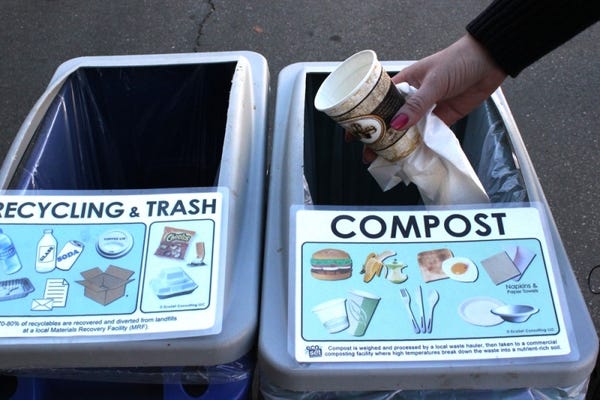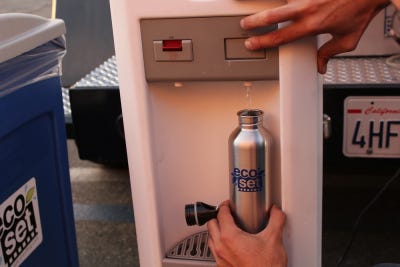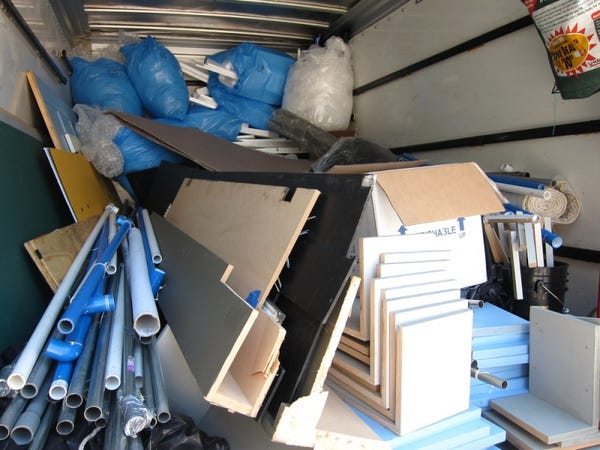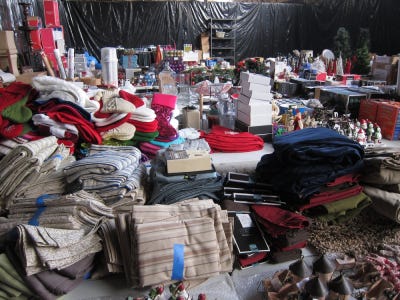Shooting For Zero: A Q&A with Kris Barberg of EcoSet
An interview with Kris Barberg, executive director of EcoSet Consulting, which strives to reduce waste on commercial film productions.
What’s the story behind the creation of EcoSet? What indicated the need for this service?
EcoSet has its roots in Minneapolis, which is where myself and the owner of our company got our start in film production. Shannon SchaeferBart founded EcoSet in 2008 while working as a freelancer in both Minneapolis and Los Angeles. After a few years in the film industry, she saw a need for more sustainable practices and decided to be part of that change.
Shannon saw an opportunity to initiate environmentally responsible production practices while working on the Coen Brothers film, "A Serious Man," which filmed in the Minneapolis in 2008. In addition to her responsibilities as the Production Secretary, Shannon researched and proposed ways to make the set more eco-friendly. She got approval from the studio, and then proceeded to implement reusable water bottles, water refilling stations, and comprehensive recycling and composting on set and in the production office. In 10 shoot weeks, 11 tons of waste were diverted from the local waste stream. During wrap, office supplies and production elements were donated to the local community.
Shannon founded EcoSet shortly after this experience and these practices were the foundation for EcoSet Consulting. EcoSet’s services are tailored specifically for the commercial production industry. Due to the fast-paced, ever-changing and temporary nature of advertising productions, these shoots generate an enormous amount of waste, and we’ve crafted our services to be a collaboration with crews as they begin to make responsible disposal choices and use resources more efficiently.
What range of services do you provide? When a production contracts with you, how do you go about working with them?
EcoSet is a full service company. We provide consultation and strategy as well as hands-on supervision of our zero waste services on set. When we’re engaged by advertiser, creative agency or production company, we pre-determine the environmental priorities and solutions for the project. Then during pre-production, our coordination team communicates with various members of the production to orchestrate the logistics of waste prevention and diversion and other practices like implementing solar and renewable energy. During shoot days, there are one or two EcoSet crewmembers on location. EcoSet is like another department on set and our goal is to keep discarded materials from reaching landfills. We partner with local haulers in the cities where we work, and EcoSet collects and sorts the materials on set based on what the specific hauler can recover.
 Our crew is on set first thing in the morning until “last man out” to ensure maximum waste diversion and materials recovery through composting, recycling and collecting reusable items for repurposingin the community. We assist the various departments with their disposal needs, and our greatest impact is in composting food waste and disposable products related to catering and craft service, as well as recovering materials discarded by the art department for the creative components of the shoot.
Our crew is on set first thing in the morning until “last man out” to ensure maximum waste diversion and materials recovery through composting, recycling and collecting reusable items for repurposingin the community. We assist the various departments with their disposal needs, and our greatest impact is in composting food waste and disposable products related to catering and craft service, as well as recovering materials discarded by the art department for the creative components of the shoot.
Can you provide an approximation of the amount of waste generated on an average film shoot?
The amount of waste varies by type of project and filming location, but a typical 3-day shoot in Los Angeles with 70 - 100 people can generate up to 2,000 pounds of waste. If set walls and construction elements are being discarded on a project, that total is much higher. We estimate that U.S.-based commercial productions generate more than 18 million pounds of waste annually. Quite often on standard shoots, items like batteries, electronic waste, film scraps, paint and other hazardous chemicals are discarded because there is no time or infrastructure built in for proper disposal. With EcoSet, we take the burden off of busy crews and ensure that hazardous and/or universal waste is not entering local waste streams.
What are some “low-hanging fruits” on most sets in terms of waste prevention? Conversely, what are some greater lengths you go to to divert waste?
 One main initiative is waste prevention through the use of reusable water bottles. When stainless steel bottles and drinking water refill stations are available on set, it promotes the mindset of reuse and is part of the transition to a more efficient use of resources. In three years, EcoSet and our clients have avoided the use of more than 60,000 single-use plastic bottles on commercial sets. That number is much larger, though, because these bottles go on to other film sets and into peoples' daily lives, promoting reuse and replacing disposable bottles for years to come.
One main initiative is waste prevention through the use of reusable water bottles. When stainless steel bottles and drinking water refill stations are available on set, it promotes the mindset of reuse and is part of the transition to a more efficient use of resources. In three years, EcoSet and our clients have avoided the use of more than 60,000 single-use plastic bottles on commercial sets. That number is much larger, though, because these bottles go on to other film sets and into peoples' daily lives, promoting reuse and replacing disposable bottles for years to come.
Also in line with waste prevention is requesting reusable products on set. If floor protection is needed in a location, we recommend renting reusable rugs versus disposable fiber-based layout board. EcoSet connects with the caterers and ask them to use washable cutlery and dishes for lunches instead of disposables. When disposables are used, we make sure they are plant-based and can be composted.
After waste prevention comes waste diversion, so EcoSet's crew members are on set to oversee the collection of reusable materials, recycling and composting About half of the waste on set is related to food and can be converted to soil if it's collected properly. Very little is actually trash.
 One initiative that sets us apart is our ability to recover reusable items like packaging materials, wood scraps, rope, plastic sheeting, polystyrene and lighting expendables. We consider these items resources rather than waste. We donate discarded lighting gels to film students who consider even scraps very valuable. Local artists and theaters make good use of foam and polystyrene pieces, wood, plastic piping, and numerous other materials.
One initiative that sets us apart is our ability to recover reusable items like packaging materials, wood scraps, rope, plastic sheeting, polystyrene and lighting expendables. We consider these items resources rather than waste. We donate discarded lighting gels to film students who consider even scraps very valuable. Local artists and theaters make good use of foam and polystyrene pieces, wood, plastic piping, and numerous other materials.
The part of our service with an impact beyond film sets is our donations process. On behalf of our clients, EcoSet donates what is seen on-camera to the local community. Clothing, props, furniture, set dressing and scenic materials are donated to local partners who have the greatest need and can give the items the longest lifecycle. We strive to align these donations with our clients’ existing charitable mission, connecting these valuable items to educational partners, artists and social service organizations.
 One of our partnering clients is Target Corporation and together we’ve been impacting local communities since 2009. An example of this is the 3rd Annual Target-EcoSet Holiday Donations Event that took place last November. Target's holiday commercial productions reused clothing, props, set dressing and holiday decor from their various holiday ads that were filmed July through October. EcoSet then donated these items to 22 local organizations. Families who couldn't afford Christmas trees or gifts for their children were among the recipients, as well as non-profits whose budgets didn't include holiday decorations for their facilities, but they ended up with amazingly decorated spaces to enliven their programming. Every year, this event touches many lives, and last year over $37,000 fair market value of goods were donated on behalf of Target.
One of our partnering clients is Target Corporation and together we’ve been impacting local communities since 2009. An example of this is the 3rd Annual Target-EcoSet Holiday Donations Event that took place last November. Target's holiday commercial productions reused clothing, props, set dressing and holiday decor from their various holiday ads that were filmed July through October. EcoSet then donated these items to 22 local organizations. Families who couldn't afford Christmas trees or gifts for their children were among the recipients, as well as non-profits whose budgets didn't include holiday decorations for their facilities, but they ended up with amazingly decorated spaces to enliven their programming. Every year, this event touches many lives, and last year over $37,000 fair market value of goods were donated on behalf of Target.
Can you provide some examples of shoots you have worked on, how waste was diverted in each case, and estimated amounts of waste diverted on those shoots?
Our diversion on each shoot ranges from 85 to 95 percent. On one shoot in Los Angeles last year, we diverted 97 percent of waste from the landfill and donated huge set walls to a local theater. Of the 2,325 pounds of total waste generated, 608 pounds were composted, 90 pounds were recycled, 1,565 pounds were repurposed and 62 pounds were landfilled. We avoided the use of over 490 single use plastic bottles by distributing reusable bottles.
What was the most interesting shoot your company has worked on and why?
 In general, the most interesting shoots are the ones with unique creative elements such as giant yarn balls or custom props like a 600-pound foam watering can. Rather than discarding these custom props after the project wraps, EcoSet connects them to local schools, artists, filmmakers and theaters who can extend the lifecycle of these pieces. For example, we donated the giant watering can along with a giant teacup, cake tray and shovel to a horticultural society to use as an exhibit in their annual flower shows. The giant yarn balls were donated to a local performance artist who uses knitting and yarn as a visual element in one of her shows.
In general, the most interesting shoots are the ones with unique creative elements such as giant yarn balls or custom props like a 600-pound foam watering can. Rather than discarding these custom props after the project wraps, EcoSet connects them to local schools, artists, filmmakers and theaters who can extend the lifecycle of these pieces. For example, we donated the giant watering can along with a giant teacup, cake tray and shovel to a horticultural society to use as an exhibit in their annual flower shows. The giant yarn balls were donated to a local performance artist who uses knitting and yarn as a visual element in one of her shows.
Our shoots get really interesting when they take place outside of the United States in markets where crews are not accustomed to sustainable practices on set. We’ve worked on or advised projects in Milan, Buenos Aires and the Caribbean where we had to improvise with available local resources. There was no commercial composting on the island of Antigua, so we donated food scraps from the production to a local pig farmer who was grateful for the free meal for his livestock. In Buenos Aires, we donated plant-based food waste to a local university with a composting program. There is no existing municipal infrastructure for recycling in Buenos Aires, so we partnered with a local cooperative of Cartoñeros (translated as “Cardboard People”), who sort through bags of trash in the streets at night collecting cans, glass, plastic, paper and other materials that they can sell to industries. The cooperative was happy to receive all the beverage containers, paper and cardboard that we sorted on a five-day shoot of more than 100 crew members.
Every time we work in a new market, even in North America, we hear the same thing from the crews: they didn’t know that sustainable practices on set could be so seamless, and they wish EcoSet was on every shoot.
Any plans for future expansion, new service offerings, etc.?
Beyond Los Angeles, EcoSet has been developing services in Minneapolis and New York since 2009, and we have a growing list of environmental resources, donation partners and contractors in other cities in the United States and internationally.
Why do you feel sustainability and waste reduction in this segment is important?
The film industry has had a pervasive mindset of disposability for decades and has been a huge contributor to local landfills. In the past few years, film studios and TV networks are addressing this reality and making changes internally to the way their features and TV shows are filmed. The commercial production industry is slowly beginning to transition to better practices as well, and we’re proud to be a leader in this movement.
About the Author
You May Also Like


